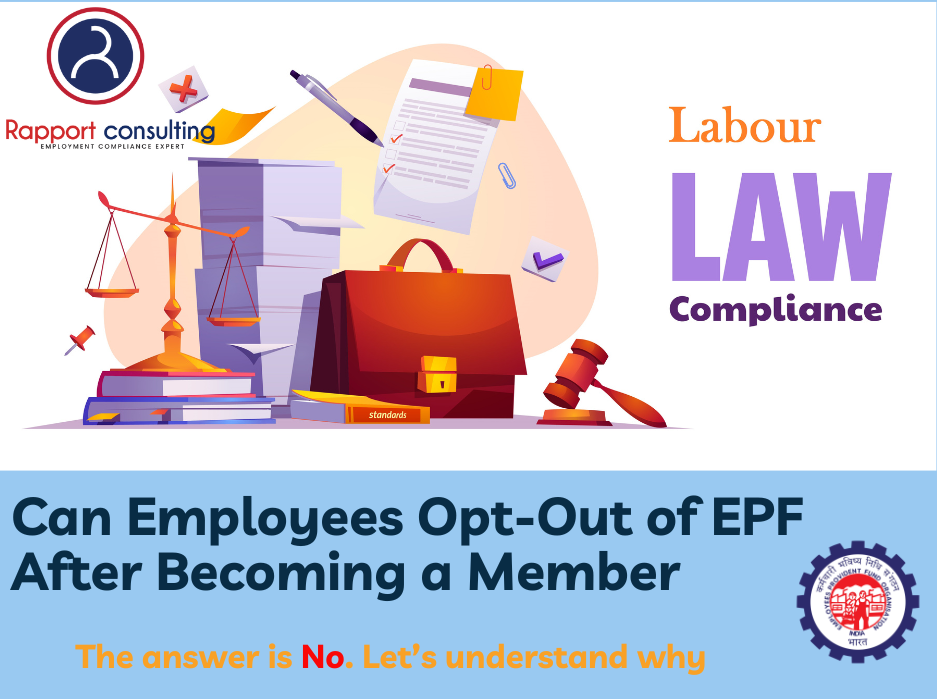
Can Employees Opt-Out of EPF After Becoming a Member?
When it comes to EPF compliance in India, one of the most frequently asked questions by HR professionals is:
👉 “Can an employee opt-out of EPF once he or she has already been enrolled?”
The answer is No. Let’s understand why.
1. What is EPF?
The Employees’ Provident Fund (EPF) is a retirement savings scheme under the Employees’ Provident Funds and Miscellaneous Provisions Act, 1952. It applies to establishments with 20 or more employees and ensures financial security through contributions from both employer and employee.
2. Opt-Out Option at First Employment Only
- An employee can avoid EPF deduction only at the time of joining the first job, provided:
- Basic Salary + Dearness Allowance is above ₹15,000 per month, and
- The employee has never been a member of EPF earlier.
- Such employees are termed Excluded Employees under Para 2(f) of the EPF Scheme, 1952.
3. Once a Member, Always a Member
- If an employee already has a UAN (Universal Account Number) and has contributed to EPF:
- He/she cannot opt-out in future employment,
- Membership continues even if salary rises above ₹15,000,
- Employers are legally required to deduct EPF in all subsequent jobs.
4. Legal Reference
As per Para 2(f), EPF Scheme 1952:
“Excluded Employee means an employee whose pay at the time he is otherwise entitled to become a member of the Fund exceeds ₹15,000 per month, provided he has never been a member of the Fund before.”
5. Key Compliance Takeaways for HR
✅ New employees with salary above ₹15,000 and no past UAN → may claim exemption using Form 11.
✅ Employees with existing UAN and past EPF contributions → mandatory EPF deduction.
✅ Employers not following EPF rules → face penalties under the EPF Act.
Frequently Asked Questions (FAQ) on EPF Opt-Out
Q1. What if an employee’s salary increases above ₹15,000 later?
👉 Once an employee becomes an EPF member, salary hikes do not affect membership. Contributions remain mandatory.
Q2. Can contractual or temporary employees opt out of EPF?
👉 No. If they meet eligibility criteria and the establishment is covered under EPF, deductions are compulsory.
Q3. Can an employee withdraw the PF balance and close the account to opt-out?
👉 Withdrawal is allowed only under certain conditions (resignation, unemployment, retirement, etc.), but this does not remove EPF membership. If the employee joins another covered organization, EPF contributions restart.
Q4. Is there any form to opt-out after becoming a member?
👉 No. Form 11 applies only to new employees who qualify as excluded employees. After membership begins, no form can be used to opt-out.
Q5. Can employer and employee mutually agree to skip EPF?
👉 No. Even with mutual agreement, skipping EPF is illegal and punishable under the Act.
Conclusion
🔹 Opt-out is allowed only before becoming a member (first job + salary > ₹15,000).
🔹 Once a UAN is generated and EPF contributions start, membership is permanent.
🔹 HR and compliance officers must ensure timely EPF deductions to avoid penalties.
EPF opt-out India, Can employees opt out of EPF, EPF rules for HR, EPF opt-out option, Excluded employee under EPF, EPF compliance India.
